 Martenitsa adds glamour to Bulgarian Embassy
Martenitsa adds glamour to Bulgarian Embassy
 Mysterious 'Dolan Tribe' in Xinjiang
Mysterious 'Dolan Tribe' in Xinjiang
 This is Shanghai
This is Shanghai
 Female attendants serving 'two sessions'
Female attendants serving 'two sessions'
 The many tears of DiCaprio
The many tears of DiCaprio
 Dan Dan's bittersweet opera life
Dan Dan's bittersweet opera life
 A dream wedding for a girl suffering from cancer
A dream wedding for a girl suffering from cancer
 Old photos of Anti-Japanese War (1937-1945)
Old photos of Anti-Japanese War (1937-1945)
 This is Beijing – Nanluoguxiang
This is Beijing – Nanluoguxiang
MOSCOW, March 8 -- Russia said Saturday it was willing to continue dialogue with the current Ukrainian authorities, while western countries were abuzz over forming alliance against Russia and threatening to resort to sanctions.
"We are ready to continue the dialogue on the understanding that the dialogue must be honest, partnership-like, without attempts to show us almost as a party to the conflict," Russian Foreign Minister Sergei Lavrov said.
He also said Moscow would push for an investigation into allegations that snipers cut down scores of protestors in Kiev's Independence Square and urged the international community to probe the case.
Stressing that Russia does not expect a new cold war, Lavrov said Friday that Moscow and the West could seek some common ground to solve the Ukraine crisis through dialogue.
Commenting on the situation in Crimea, the epicenter of the ongoing crisis in Ukraine since Ukrainian President Viktor Yanukovych was ousted by parliament on Feb. 22, Lavrov said the scheduled referendum on March 16 reflected the common will of the Crimea people.
He also warned the United States not to impose any sanctions on Moscow, as Washington would inevitably be hit in return.
Uneased by Russia's stance on the Ukraine crisis, the United States was busy forming alliance against Russia and threatening to resort to sanctions.
In fact it has imposed visa bans and financial sanctions since Thursday on a number of Ukrainians and Russians it claims responsible for the crisis.
Washington said sanctions will be furthered if Russia does not withdraw its forces back to their bases in Crimea.
U.S. President Barack Obama also spared no efforts on forming alliance against Russia by making phone calls to leaders of other western countries and their alliances.
On Saturday Obama called six world leaders separately, including British Prime Minister David Cameron, French President Francois Hollande,Italian Prime Minister Matteo Renzi, and the presidents of three Baltic countries of Lithuania, Latvia and Estonia.
Hollande and Obama stressed over phone the importance for Russia to start immediately dialogue with Ukraine, and warned of new measures against Russia if no progress was made in this direction, French president's office said in a statement.
The two leaders also reaffirmed their support for the new Ukrainian authorities, as well as for the preparation of Ukrainian presidential election, scheduled for May 25, the statement said.
Cameron and Obama discussed the situation in Ukraine, the outcome of the European Council and the U.S. measures, a Downing Street spokesperson said in a statement.
Both leaders agreed that there is still an opportunity for Russia to resolve the situation diplomatically, the spokesperson added.
"Both the prime minister and the president firmly believe that the proposed referendum in Crimea would be illegal and that any attempt to legitimize it would result in further consequences for Russia," the spokesperson said.
When talking with the leaders of Baltic countries, Obama told them that the United States supports them and is committed to its collective defense commitments under the North Atlantic Treaty, the White House said.
He also reaffirmed Washington's enduring support for the security and democracy of the Baltic countries.
The United States plans to expand military cooperation with Poland and Baltic states to show "support" for its allies amid crisis in Ukraine, U.S. Defense Secretary Chuck Hagel said Wednesday.
U.S. Secretary of State John Kerry warned Russia that any steps to annex Ukraine's Crimea region would close the door to diplomacy, a U.S. State Department official said.
 Chaihe village, pure and peaceful fairyland in snow
Chaihe village, pure and peaceful fairyland in snow Belgians warmly welcome arrival of China's giant pandas
Belgians warmly welcome arrival of China's giant pandas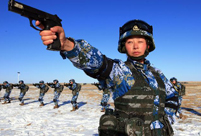 Female marines receive tactical training in NW China
Female marines receive tactical training in NW China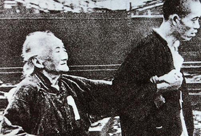 Blood memory: Nanjing Massacre in 1937
Blood memory: Nanjing Massacre in 1937 Top 10 pure beauties in showbiz
Top 10 pure beauties in showbiz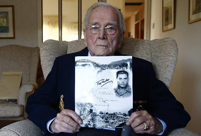 British WWII veteran: I can't forgive Japan
British WWII veteran: I can't forgive Japan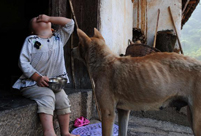 Tongban's dream of prosperity
Tongban's dream of prosperity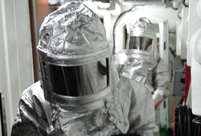 Chinese frigate Yancheng holds drills in Mediterranean Sea
Chinese frigate Yancheng holds drills in Mediterranean Sea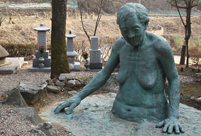 A visit to comfort woman's home in South Korea
A visit to comfort woman's home in South Korea Fairyland? Qingdao in sea of clouds
Fairyland? Qingdao in sea of clouds Top 10 most handsome faces in Asia in 2013
Top 10 most handsome faces in Asia in 2013 Female celebs with beautiful long legs
Female celebs with beautiful long legs Cat 'guardians' in Forbidden City
Cat 'guardians' in Forbidden City Large numbers of ancient coins excavated in Inner Mongolia
Large numbers of ancient coins excavated in Inner Mongolia Leisurely life beneath Zhonggulou, where time travels slower
Leisurely life beneath Zhonggulou, where time travels slowerDay|Week|Month